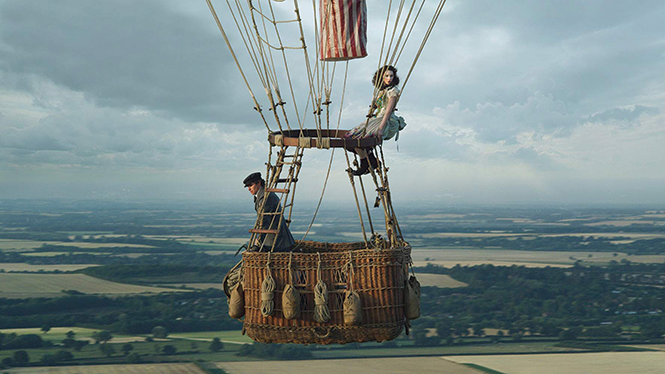
Critics spend so much time complaining about movies with thinly-drawn characters, that The Aeronauts presents a bit of a conundrum: Is it possible to spend too much time drawing those characters? Certain genres provide widely varying examples of where the sweet spot lies, so there's never going to be a simple formula. But there are times when you're watching a movie deliver a certain visceral intensity, and you realize that every time it pauses to fill in a bunch of blanks in the characters' lives, you're tapping your foot waiting to get back to the good stuff.
The Aeronauts begins with a premise that promises a lot of high-risk excitement: the real-life 1862 scientific expedition in which proto-meteorologist James Glaisher (Eddie Redmayne) took off in a hot air balloon to prove theories about predicting weather. For his balloon pilot, he recruits Amelia Wren (Felicity Jones, playing a fictionalized amalgam of other early female aviation pioneers), whose previous flight resulted in the death of her husband. Over the course of a single day, they attempt to break a record for the highest altitude that any human had reached at that time, with all of the accompanying dangers of venturing that far into the unknown and unexplored.
The reunion of the two The Theory of Everything co-stars provides a solid chemistry to the dynamic which initially gives Jones a lot more to work with as the daredevil entertainer whose theatrics for the assembled witnesses to history agitate Redmayne's pragmatic scientist. There's actually a fascinating subtext built into those early scenes, as The Aeronauts provide a sense of the way financiers of Glaisher and Wren's flight turned it into a spectacle to which they could sell tickets. And it's interesting watching Wren demonstrate an instinctive sense for giving the people what they want, because that's also what the guys with the money want.
Once they're airborne, the narrative turns its focus on the many challenges faced by the two aeronauts, and this is where director/co-writer Tom Harper is at the top of his game. At times, it feels like a Victorian-era spin on Apollo 13, with our protagonists left to their own wits to resolve the problems that emerge when they're caught in an unexpected storm, or when the high altitude freezes their gas release apparatus, threatening to send them ever higher. On a big screen, these scenes are dizzyingly effective; those with a fear of heights might shrink into their seats at the sight of Wren being forced to scale the outside of their balloon along the rope netting. Whenever The Aeronauts is squarely about being a survival adventures built on resourcefulness and maybe a touch of dumb luck, it's exhilarating.
The problem is it's not about that nearly as much as it is about all of the stuff that leads those two characters to the point where they face imminent death. Harper repeatedly flashes back to the difficulties faced by Glaisher and Wren, respectively, and it's pretty rote stuff—Glaisher upset at being mocked by his scientific peers over his belief that weather can be understood scientifically, and Wren coping with the guilty aftermath of surviving the flight that took her husband's life. There's even an occasional digression into Glaisher's attempts to impress and please his father (Tom Courtenay), who has begun to slide into dementia. There's nothing exactly wrong with these scenes, but they're almost always a sluggish distraction from the great material about whether or not Glaisher and Wren can make it back from their 35,000-foot ascent.
It is, of course, ultimately significant that we grasp why Glaisher might be willing to risk his life—or at least hypoxia and frostbite—for his experiments, and why Wren might feel a need for redemption. But for a relatively recent point of comparison, consider Robert Redford as the stranded, nameless mariner in All Is Lost, a movie that understood how the nuts and bolts of staying alive are enough to keep viewers engrossed without a catalog of motivations. As good as The Aeronauts is when it's soaring above the clouds, it's also a reminder that sometimes, life is motivation enough.